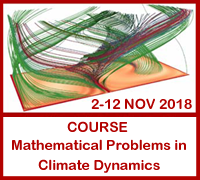
MATH-GEO: Development of new mathematical methods for Oceanographic and Atmospheric Applications
The aims of MATH-GEO project
Nonlinear processes, such as advection and turbulent mixing, play a central role in geophysical sciences. The theory of nonlinear dynamical systems provides a systematic way to study these phenomena. Its stochastic extension also forms the basis of modern data analysis techniques, predictability studies and data assimilation methods. Contributions in the field of Topology and Dynamics of Chaos include methods conceived to unveil the structure organizing flows in phase space, building the gap between data and low-dimensional modeling. Low-order models in climate dynamics are highly desirable, since they can provide solutions in cases where high-resolution numerical simulations cannot be implemented, as in short-term wind forecasting. At the same time, the procedure provides a tool-kit for model validation, emulation or inter-model comparison, with interesting prospects in all fields of oceanographic and atmospheric sciences, including climate detection and attribution. The strategy constitutes an unprecedented and promising perspective, offering an original approach to the subject, with mathematical concepts that are not necessarily widespread in the geophysics scientific community.
(MATH-GEO)
Project Goals: Development of new mathematical methods for Oceanographic and Atmospheric Applications, leading to innovating strategies for low-order modeling, with a potential application to short-term forecasting for wind-farm operation, atmosphere, ocean and climate dynamics research, and data analysis in the form of tracer trajectories.
International Coordinator
CIMA & IFAECI
Intendente Güiraldes 2160
Ciudad Universitaria
Pabellón II - 2do. piso
(C1428EGA) Buenos Aires
Argentina
TE: (54)(11) 5285-8467
Fax: (54)(11) 4788-3572
Email: denisse.sciamarella@cima.fcen.uba.ar
